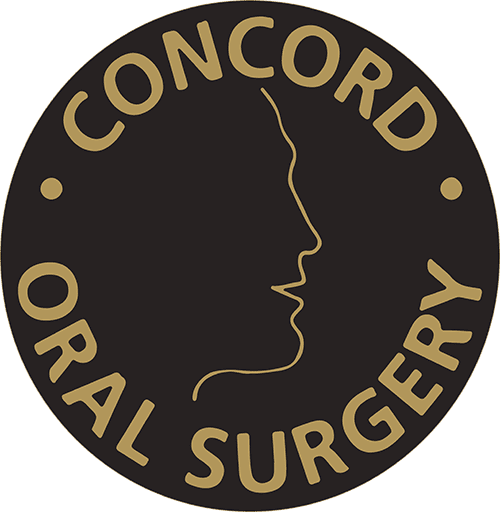Losing teeth is so much more than just gaps in your smile. Losing even one tooth can affect your entire well-being.
Beyond the impact on chewing and speaking, missing teeth can cause your other teeth to shift, lead to bone loss, and even alter the shape of your face. Over time, this can result in premature aging, as your facial structure loses support.
Fortunately, with the right tooth replacement options, you can protect your jawbone, avoid future dental problems, and regain full function of your mouth.
A full set of healthy teeth does more than restore your appearance—it rejuvenates your life!
Key Takeaway
Dental implants offer a superior solution for tooth replacement. They offer a natural look and feel, stability, and durability. Implants preserve the jawbone, promote oral health, and improve overall mouth function.
Implant Tooth Replacement: The Superior Solution
Dental implants are widely regarded as the gold standard in tooth replacement.
They consist of small titanium posts placed directly into the jawbone, acting as artificial tooth roots. They offer exceptional stability and durability while closely imitating natural teeth.
Dental implants are considered the “superior solution” for tooth replacement for several reasons. While dental bridges and traditional dentures are effective, they do not provide the same level of stability and comfort that implants offer.
Here are a few reasons why dental professionals consider dental implants to be the best tooth replacement option:
- Natural feeling: Implants are designed to blend seamlessly with your natural teeth, providing a realistic appearance.
- Unmatched stability: Unlike conventional dentures, implants remain securely anchored in the jawbone, allowing you to eat, speak, and smile with confidence.
- Longevity: Dental implants are a cost-effective long-term solution. With proper care, they can last a lifetime.
- Jawbone preservation: Implants stimulate the jawbone, preventing bone loss and maintaining your facial structure over time.
- Improved oral health: Unlike bridges, which require altering adjacent teeth, implants do not affect surrounding healthy teeth.
- Improved quality of life: Dental implants allow you to eat a wider variety of foods and give you a renewed sense of confidence.
By choosing dental implants, you are not just replacing teeth—you are investing in a healthier, more confident future.
Key Takeaway
Dental implants are widely considered the gold standard for tooth replacement due to their natural appearance, unmatched stability, and long-term benefits. They provide a realistic and comfortable solution, and help preserve jawbone health and improve overall quality of life.
Full Mouth Dental Implants
Full mouth dental implants, also known as full arch dental implants, are a comprehensive solution for replacing an entire set of missing or severely damaged teeth in the upper or lower jaw.
This dental procedure involves placing a series of implants into the jaw bone to support a full arch of artificial teeth, providing a stable, permanent alternative to traditional dentures.
Ideal candidates for full mouth dental implants are individuals who have lost most or all of their teeth, or whose remaining teeth are compromised due to decay, gum disease, or trauma.
Full Mouth Implant Options
Choosing a full mouth restoration solution depends on various factors, including your oral health, lifestyle, and budget.
Several types of restoration are available, each with benefits and drawbacks. Here are the most common types and their pros and cons.
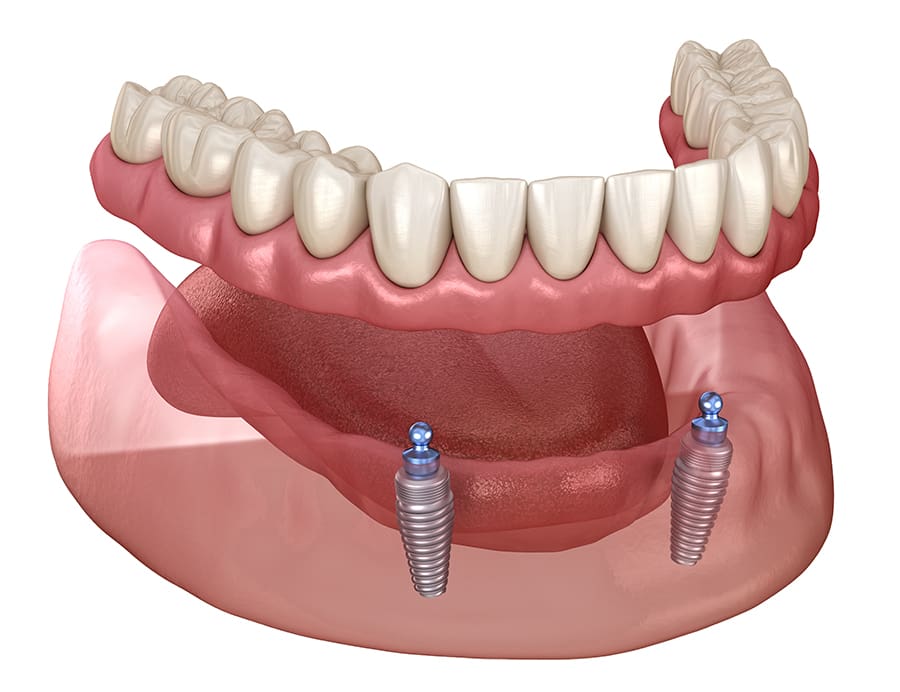
Ball Attachment Dentures
Ball attachment dentures are the simplest form of implant-retained dentures. They are suitable for the lower teeth only and involve securing a denture to two dental implants placed in the lower jaw.
The denture itself has corresponding sockets or clips that snap onto these ball attachments, holding the denture firmly in place.
The ball attachments help keep the dentures more stable than traditional dentures, reducing movement and making it easier to speak and eat. They put less pressure on the gums since they’re anchored by implants, which can provide a more comfortable fit.
However, there will still be some movement of the denture since it is only secured with two implants. Food can get trapped under the denture causing sore spots on the gums. Meticulous oral hygiene is very important with this type of implant-supported denture.
While they are more stable than traditional dentures, ball attachment dentures still require maintenance. The attachments may need periodic adjustment or replacement over time, adding to ongoing cost.
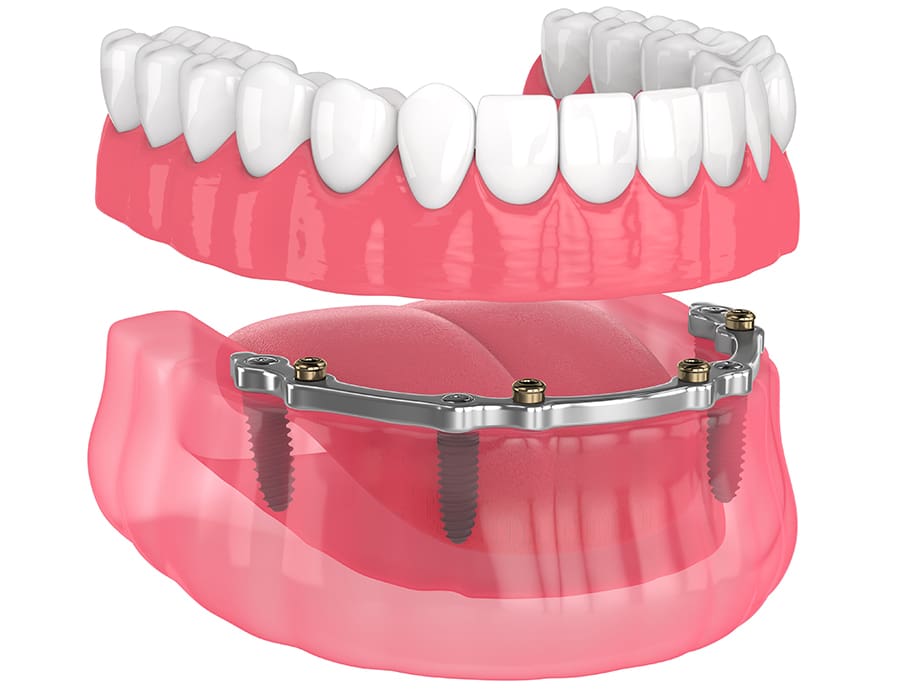
Bar Attachment Dentures
Bar attachment dentures are removable dentures that use multiple implants to anchor a custom-made bar in the jaw. The denture snaps onto the bar, providing increased stability and support.
Depending on the patient’s anatomy, four to six implants are placed in the jaw. Once healed, a custom bar is attached to the implants, and the denture snaps securely onto this bar via internal clips, forming an “overdenture.”
The bar attachment system distributes biting forces more evenly across the jaw, offering a higher level of stability than traditional dentures. This can make it easier to eat, speak, and perform daily activities with confidence.
The only real disadvantage is that over time, the clips and bar may require maintenance or replacement due to wear, which can add to ongoing costs.
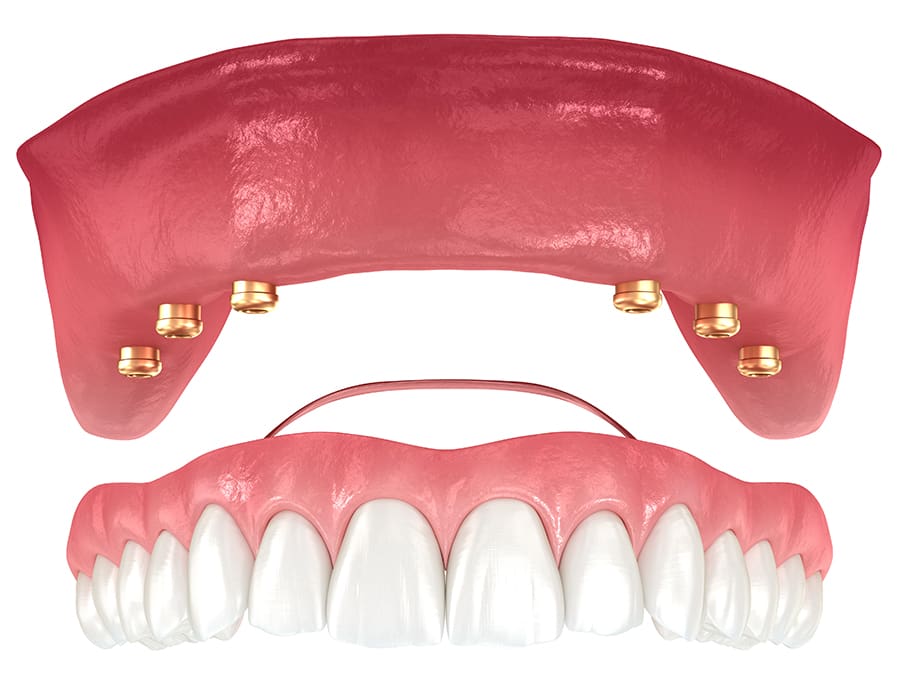
Screw Retained Dentures
Screw-retained dentures are permanently attached to dental implants using screws.
Unlike traditional removable dentures, these dentures are fixed in place and can only be removed by a dentist. They offer a more permanent solution and provide a natural look and feel similar to natural teeth.
Five or more implants are placed in the jaw, and a permanent denture is attached to the implants using screws or clasps. The denture does not touch the gums, allowing for easy cleaning underneath without the need for removal.
Since these dentures can only be removed by a dentist, maintenance or repairs are more involved compared to removable options.
This type of implant-supported denture is more expensive than ball-retained or bar attachment dentures. However, the stability and natural look they provide are unmatched.
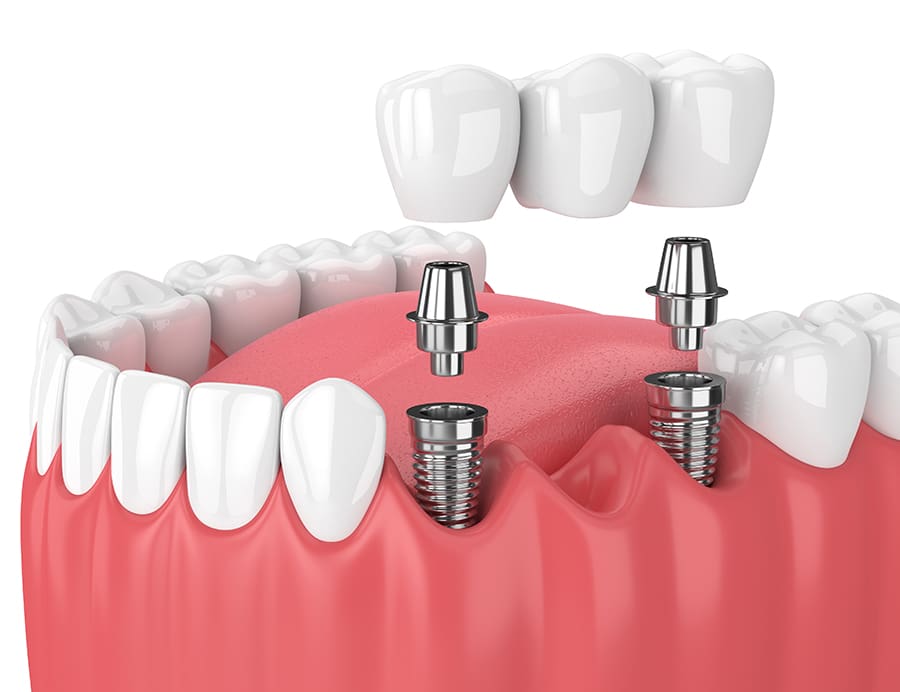
Implant-Supported Bridge
An implant-supported bridge is a dental bridge anchored to implants rather than natural teeth, making it a durable and fixed option for replacing multiple missing teeth in a row.
Two or more implants are placed in the jaw, and a custom bridge is created to replace missing teeth. The bridge is then securely attached to the implants rather than the adjacent teeth like traditional implants do. This offers superior stability and doesn’t require the adjacent teeth to be modified in any way.
Implant-supported bridges are permanently fixed to the dental implants. They are custom-made to match the shape, color, and alignment of natural teeth, resulting in a natural-looking smile.
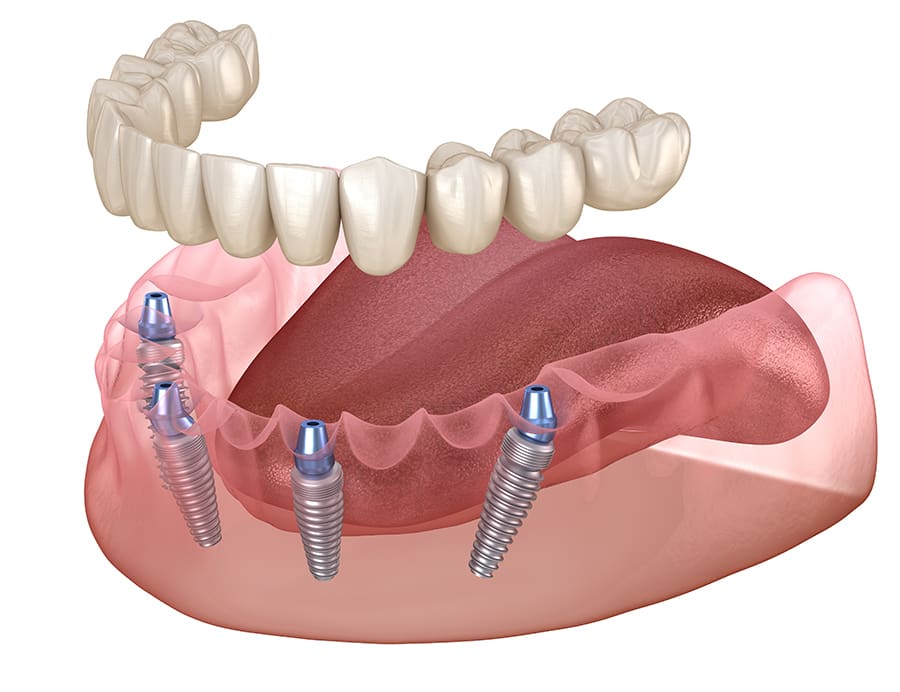
All-on-4® Dental Implants
The All-on-4 dental implant system is a full-arch replacement solution for patients who have lost most or all of their teeth in the upper or lower jaw.
It uses just four dental implants to support a complete set of artificial teeth, which can be attached the same day as the implant surgery.
The All-on-4 technique strategically places four implants in the jawbone: two implants at the front and two at the back, which are angled to maximize contact with the bone and provide support where it’s most needed.
This approach allows for a stable foundation without the need for bone grafting (in most cases), even if bone loss has occurred.
| Dental Implant Options | Pros | Cons |
|---|---|---|
| Ball Attachment Dentures | – More stable than traditional dentures – Affordable implant option | – Some movement of the denture still occurs – Requires periodic adjustments – Food particles may get trapped under the denture |
| Bar Attachment Dentures | – Increased support and stability – The denture can be removed for easy cleaning – Reduced need for bone grafting – Faster treatment and healing time | – Slightly bulkier than other options – More implants required (4-6) – Can be more expensive than ball attachments |
| Screw Retained Dentures | – Provides the highest level of stability – Offers a permanent, non-removable solution that feels more like natural teeth – Doesn’t touch gums, easy to clean underneath | – Requires 5+ implants – Takes more time and requires dexterity to clean – Only removable during dental visits |
| Implant-Supported Bridge | – Fixed solution – Does not rely on natural teeth for support – Natural look and feel – Preserve adjacent teeth | – Requires more implants for stability – More expensive than traditional bridges |
| All-on-4 Dental Implants | – Quick recovery – Minimally invasive due to fewer surgical procedures – Immediate teeth in a single visit – More accurate implant placement and reduced chair time – Usually eliminates the need for bone grafting | – May not be suitable for those with severe bone loss – Less flexibility in implant placement |
Concord Oral Surgery: Your Partner in Full Mouth Dental Implant Solutions
At Concord Oral Surgery, we provide expert care with a personal touch.
Led by Dr. Robert Paul Barron, an accomplished oral and maxillofacial surgeon, we offer advanced treatments for various conditions related to the mouth, teeth, and facial region.
With extensive training in hospital-based surgical and anesthesia procedures, Dr. Barron can handle everything from dental implant surgery to wisdom tooth removal, bone grafting, and sinus lifts.
His expertise includes innovative techniques for rebuilding bone structure with minimal surgical intervention for optimal patient comfort.
Some reasons to choose our practice for full mouth rehabilitation include:
- Expertise and experience: Dr. Barron has practiced in Vaughan, Ontario, since 2004. He specializes in dental implant placement, bone grafting, and treating facial trauma. He is a member of the Canadian and American Associations of Oral and Maxillofacial Surgeons.
- Personalized care: We understand that each patient has unique needs, so we take a personalized approach to treatment. Dr. Barron and his team work closely with you to create a customized treatment plan that addresses your specific goals and concerns.
- State-of-the-art technology: Our office features the latest dental technology, including digital imaging and computer-guided implant tools. Our highly trained staff, including Registered Nurses, provide continuous monitoring for patient safety during and after surgery. We offer IV sedation and outpatient general anesthesia for comfort.
See for yourself why patients love our care—check out our Google Reviews to hear about their experiences at our oral surgery office in Vaughan, ON.
Schedule a Consultation With Concord Oral Surgery
Are you ready to transform your smile with dental implants?
If you are considering this life-changing solution for missing teeth, schedule a consultation with Concord Oral Surgery in Vaughan, ON. Our experienced team will assess your oral health and design a personalized treatment plan just for you.
To book an appointment at our oral surgery office in Vaughan, call (905) 669-2616 or complete the appointment request form.
FAQs About Full Mouth Dental Implants
Are full mouth dental implants a good idea?
Yes, full-mouth dental implants are a great option for individuals looking to replace multiple missing teeth. They provide stability and function similar to natural teeth, improving overall oral health and confidence.
How long do full mouth dental implants last?
With proper care and maintenance, full-mouth dental implants can last a lifetime. However, the lifespan may vary depending on individual factors such as oral hygiene habits, jawbone health, and lifestyle choices.
How painful are full-mouth dental implants?
Full-mouth dental implants are usually performed under anesthesia so that patients do not feel any pain during the surgery. Some swelling and discomfort may be expected after the procedure, but this can be managed with pain medication prescribed by your oral surgeon.
How long does it take to recover from full-arch dental implant surgery?
The recovery time for full-arch dental implants varies from person to person, but it typically takes about 3–6 months for the jawbone to fully fuse with the implants. Recovery from the implant surgery usually takes about two weeks. It is important to follow post-operative care instructions carefully for proper healing and optimal results.
How long before full dental implants feel normal?
Feeling normal after implant surgery varies depending on the number of implants placed and the type of treatment performed. Many patients who undergo single or several implant sites state that their implant surgery is non-painful and they return to work and their daily routine either the next day or within 1–2 days. Others who undergo full mouth reconstruction generally require a longer recovery period which may be 1 week, but they too report that the discomfort they experienced was less than expected and they were able to eat soft foods soon after treatment.
Is it possible to get All-On-4 dental implants for both upper and lower jaws?
Yes, All-On-4 implants can be used in both the upper and lower jaws to replace a full arch of teeth. All-On-4 is an innovative procedure that offers a convenient and efficient solution for those with missing teeth in both jaws.
Am I a candidate for full mouth dental implants?
Most people with good overall health and adequate bone density in their jaw are candidates for full-mouth dental implants. However, those who smoke or have certain medical conditions may not be suitable for the procedure. Schedule a consultation with Concord Oral Surgery to determine if you are a candidate for a full-mouth restoration.
